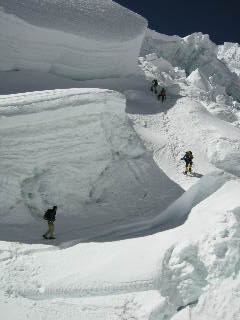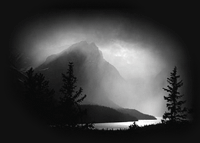The Murdoch Pollard Mistake

According to a popular altitude handbook; “Successful acclimatization is characterized by the absence of altitude illness and improved sleep. It is relatively short-lived following descent to low altitude, with effects lasting up to about two weeks.Acclimatization seems possible up to about 5000 - 5500m. Above this elevation there is a fine balance between adjustment to altitude and deterioration as a result of chronic hypoxia.” [1]
The best that can be said about this statement is that it is ambiguous and at worst misleading, as will be explained later. Meanwhile, in the Khumbu Valley the rumours are arriving thick and fast(ish). “Ish”, because here the rumours are carried by cleft stick, Sherpa mail and the occasional second hand internet whisper. One story is that the Chinese have sent sixteen torches up the mountain in relays. Another is that they summitted yesterday, but the torch blew out in the thin air.
Meanwhile the Nepalese army is maintaining their iron grip on EBC (Everest Base Camp). It must be supposed that the Chinese expected to reach the summit on 1 or 2 May, because the mountain has been closed on the South side for those two days, and we do not have permission to climb above Camp two before 10 May. Leaving base camp on 1 May was a sorry experience, 20 days of perfect weather, and no one in the Ice Fall and no one building the route above Camp Two.
From 27 to 30 April our team had been in Camp Two where we were prevented from accessing the higher part of the Western Cwm by four armed soldiers. There was also a Sherpa-stroke-spy who hung around the various camps reporting to the military on what he had seen. I guess he was looking for flags or other signs of protest, but we were only there to try and climb a mountain. I suppose what was so absurd, and slightly alarming too, was presence of rifles at Camp Two. What were the boy soldiers going to do if some-one were to show a Free (name censored) Flag? Shoot? Kill someone for having a flag at Camp Two? What sort of publicity would that create for the new democracy in Nepal; or that other country’s already disastrous PR campaign?
By the first week of May most Everest teams in most years will have been to Camp Three (7200m) and spent a night there; the final act of acclimatization before the summit push. The idea of dropping down to a low altitude before a summit push seems to have been pioneered by the Russians (those Kremlin boffins knew a thing or two about altitude) and the Russian drop-back has now become the norm for Everest. So here we are down in Pheriche, but, and this is the Big But, we have not been to Camp Three this time. There is still time for us to complete a Camp Three cycle and still make a summit attempt in the last week of May. But what if the torch does not reach the summit of Everest before 10 May? In our briefing meeting in Kathmandu, the Ministry of Tourism had told us the restrictions on the mountain would be relaxed after 10 May whatever the torch’s progress. That was not the message from the Army commandant in EBC. He suggested strongly that he would control our movements till the torching thing was done.
What does this mean for the climbers? It is possible that some may be forced to mount a summit climb without having been higher than Camp Two (6400m). Here comes the misleading part of the ambiguity mentioned above; we have heard people say “Oh, you cannot acclimatize above 5500m anyway!” Actually you can; the first time you sleep at Camp Three you don’t sleep and you feel ill. The second time you sleep better and feel well. Experience (though not the handbook) tells us that the same also applies to higher altitudes up to and including 8000m. The mistake, let us call it the Murdoch Pollard Mistake in honour of the hand book, is probably a grammatical one. One imagines that the authors intended to refer to the ability to live permanently up to 5500m in which case they need to invent or use a word like “habituation” in stead of acclimatization. (They have already defined acclimatization in the short-lived sense).
Blame it on politics perhaps; we may still be forced to make a summit attempt without having been higher than Camp Two, but to think that this is ideal would be to be mislead by the book.
[1] The High Altitude Medicine Hand Book; AJ Pollard & DR Murdoch, 1997 Radcliffe Medical Press. Page 5.
Copyright Victor Saunders 3 May 2008

